Impeachment
The 12 candidates were mostly in agreement in supporting the ongoing impeachment inquiry. The only candidate to voice hesitation was Hawaii Representative Tulsi Gabbard.
Gabbard said she was hesitant to support an impeachment inquiry if it was driven by partisan interests.
"Unfortunately, this is what we're already seen play out," Gabbard said, "as calls for impeachment really began shortly after Trump won his election."
Gabbard said she now fully supports the impeachment inquiry following the release of President Trump's phone call to Ukrainian President Zelensky.
A common criticism of the impeachment inquiry is it is a distraction from issues that affect people's day-to-day lives. Minnesota Senator Amy Klobuchar disagreed with this criticism.
"We can do two things at once, that's our job," Klobuchar said. "We have a constitutional duty to pursue this impeachment, but we can also stand up for America."
Julián Castro, former Secretary of Housing and Urban Development, shared Klobuchar's opinion.
"We can walk and chew gum at the same time," Castro said. "And all of us are out there every single day talking about what we're going to do to make sure that more people cross a graduation stage, that more families have great health care, that more folks are put to work in places like Ohio."
Former Vice President Joe Biden has unexpectedly found himself in the center of the impeachment inquiry. His campaign has managed to keep him relatively unscathed, but this vulnerability showed itself Tuesday night when moderator Anderson Cooper pressured him.
"If it's not okay for a president's family to be involved in foreign businesses," Cooper said, "why was it okay for your son when you were vice president?"
Vice President Biden was rattled by the question and deferred to Hunter Biden's statement Tuesday morning. Biden also attempted to refocus the topic to President Trump.
"What we have to do now is focus on Donald Trump," Biden said. "He doesn't want me to be the candidate. He's going after me because he knows, if I get the nomination, I will beat him like a drum."
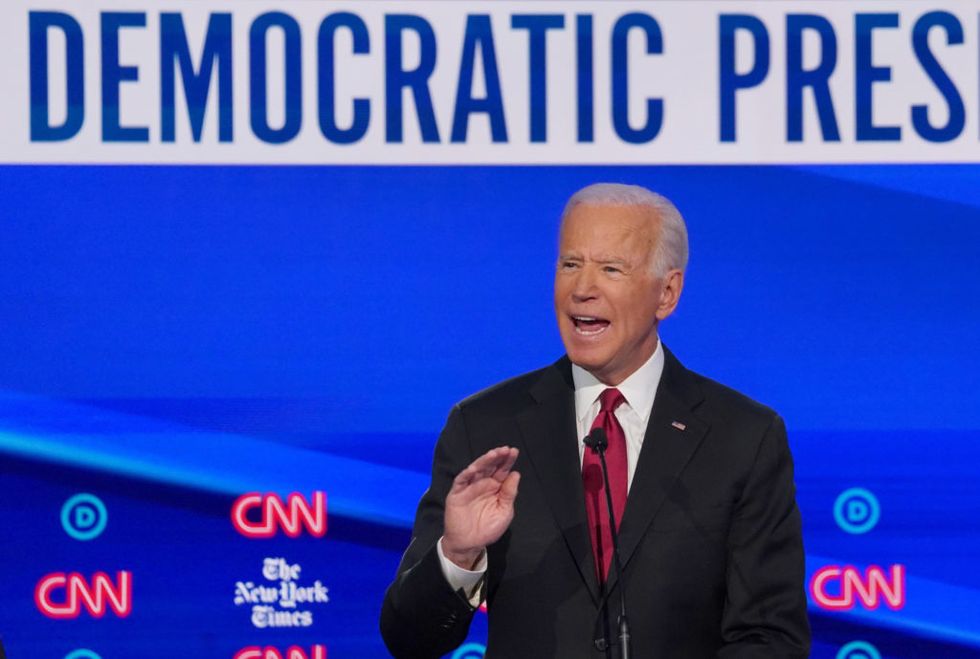
Healthcare
One of the largest divides within the Democratic candidates is healthcare reform.
The more progressive candidates are supporting Senator Bernie Sanders's Medicare for All bill, while more moderate candidates favor an opt-in public option system or an expansion of the Affordable Care Act, known as Obamacare.
Massachusetts Senator Elizabeth Warren faced widespread criticism for the first time over her support for Medicare for All, in particular from South Bend, Indiana Mayor Pete Buttigieg.
"No plan has been laid out to explain how a multi-trillion-dollar hole in this Medicare for All plan that Senator Warren is putting forward is supposed to get filled in," Buttigieg said.
Senator Warren was also criticized for her evasiveness on tax increases by Senator Klobuchar.
"At least Bernie's being honest here and saying how he's going to pay for this and that taxes are going to go up," Klobuchar said. "And I'm sorry, Elizabeth, but you have not said that, and I think we owe it to the American people to tell them where we're going to send the invoice."
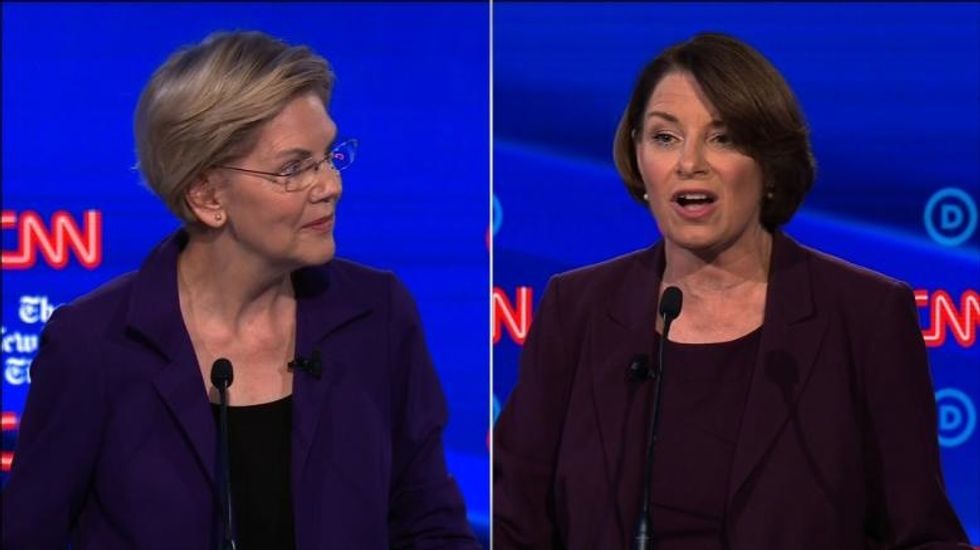
Senator Warren stuck to her statement despite constant attacks.
"Costs are going to go up for the wealthy," Warren said. "They're going to go up for big corporations. They will not go up for middle-class families. And I will not sign a bill into law that raises their costs.
"I will not embrace a plan like Medicare for all who can afford it that will leave behind millions of people who cannot."
Warren was referencing Mayor Buttigieg's "Medicare for All Who Want It" plan, a system that would keep private insurers but allow people to buy in to the Medicare plan. Warren has repeatedly criticized a public-option plan, saying that it is not truly universal, since it requires people to buy in.
Vermont Senator Bernie Sanders, who wrote the Medicare for All bill, said that taxes would go up for everyone, but for the majority of Americans, the amount they would save in healthcare costs would offset the tax increase.
"At the end of the day, the overwhelming majority of people will save money on their health care bills," Sanders said. "But I do think it is appropriate to acknowledge that taxes will go up."
A pivotal moment in the healthcare debate came from California Senator Kamala Harris.
"This is the sixth debate we have had in this presidential cycle," Harris said, "and not nearly one word, with all of these discussions about health care, on women's access to reproductive health care, which is under full-on attack in America today."
After September's debate, debate hosts were criticized for avoiding the topic of reproductive rights.
New Jersey Senator Cory Booker also used his question on healthcare to speak on the topic of reproductive rights.
"God bless Kamala, but you know what?" Booker said. "Women should not be the only ones taking up this cause and this fight."
Jobs
The next topic up for debate was job loss due to automation.
Senator Sanders and entrepreneur Andrew Yang clashed over Sanders's proposed federal jobs guarantee. Sanders's proposal includes creating jobs through infrastructure and green energy. Yang disagreed with Sanders's plan.
"The fact is, most Americans do not want to work for the federal government," Yang said.
Yang has proposed a Universal Basic Income, where every American adult would receive $1,000 per month.
"When we put the money into our hands," Yang said, "we can build a trickle-up economy from our people, our families, and our communities up."
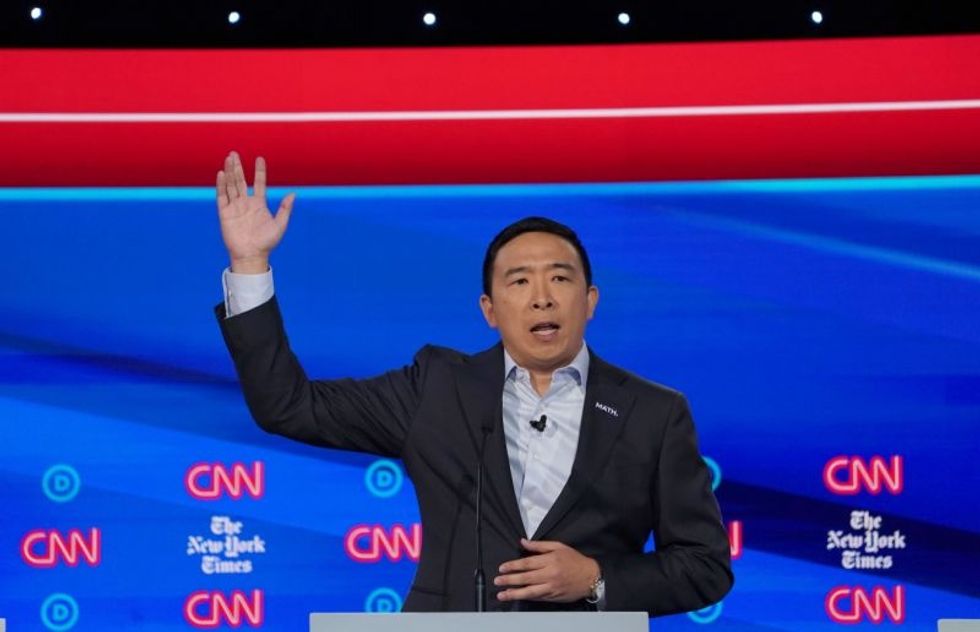
Senator Warren disagreed job loss was mostly due to automation.
"The principal reason has been a bunch of corporations," Warren said, "giant multinational corporations who've been calling the shots on trade, giant multinational corporations that have no loyalty to America. They have no loyalty to American workers."
Warren has proposed a plan she calls accountable capitalism. Under her plan, 40% of a corporation's board of directors will be required to be employees, theoretically giving a voice in corporate activity to the workers.
Senator Booker also cited another reason for job loss.
"We must make sure we are not giving corporate tax incentives for people to move jobs out of our country," Booker said, "but start to put the worker at the center of that and make sure that they have the resources to succeed."
Booker proposed raising the minimum wage to $15 an hour instead of implementing a Universal Basic Income. Booker said a higher minimum wage would give people more money than Universal Basic Income.
Booker also said he would protect and strengthen unions to raise wages and improve workers' protections.
Economy
An unlikely partnership on Tuesday's stage was between Senator Sanders and businessman Tom Steyer.
Sanders was pressured on his criticism of the billionaire class. Sanders has repeatedly said billionaires should not exist and has proposed massive tax increases on the top one tenth of one percent.
Businessman Steyer supported Sanders's proposal, despite being a billionaire himself.
"Senator Sanders is right," Steyer said. "There have been 40 years where corporations have bought this government, and those 40 years have meant a 40-year attack on the rights of working people and specifically on organized labor.
"And the results are as shameful as Senator Sanders says, both in terms of assets and in terms of income. It's absolutely wrong. It's absolutely undemocratic and unfair."
Vice President Biden proposed returning the capital gains tax to its highest level of 39.5%. A capital gains tax affects non-inventory assets, such as stocks and real estate. The current tax rate is 20% for the highest income bracket, those earning more than $434,000 a year.
Senator Warren defended her proposal for a wealth tax, which would implement a two-cent tax on wealth over $50 million.
"My question is not why do Bernie and I support a wealth tax," Warren said. "It's why is it does everyone else on this stage think it is more important to protect billionaires than it is to invest in an entire generation of Americans?"
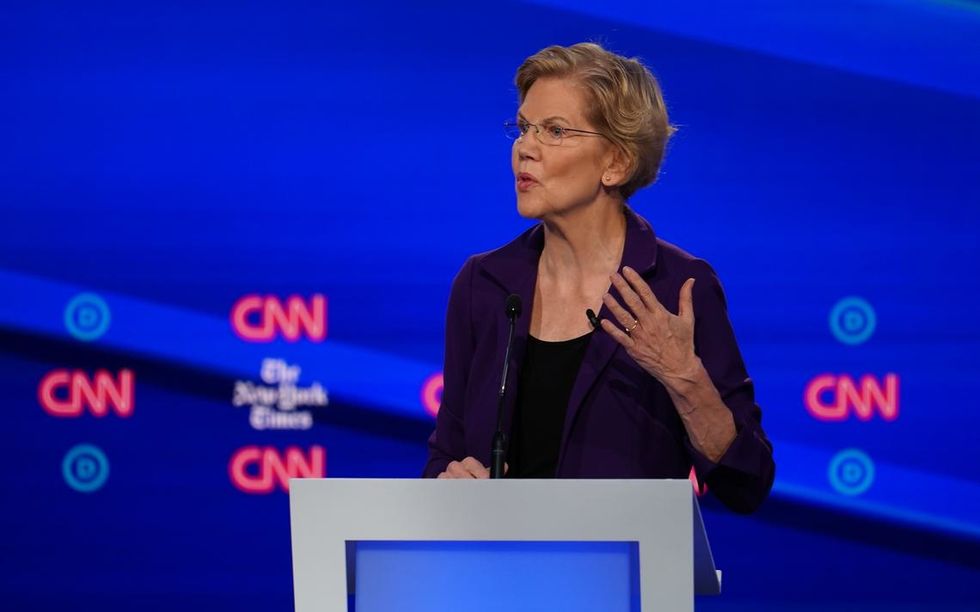
So far, Senators Warren and Sanders are the only candidates explicitly proposing a wealth tax. Other candidates have stated they would not be opposed to a wealth tax, such as Senator Klobuchar, but she criticized Warren's approach.
"I am open to it," Klobuchar said. "But I want to give a reality check here to Elizabeth, because no one on this stage wants to protect billionaires."
Still others have criticized the idea of a wealth tax in general, including entrepreneur Yang.
"A wealth tax makes a lot of sense in principle," Yang said. "The problem is that it's been tried in Germany, France, Denmark, Sweden, and all those countries ended up repealing it, because it had massive implementation problems and did not generate the revenue that they'd projected."
NPR reported the number of European countries that implemented a wealth tax decreased from 12 to three since 1990. The largest problem was millionaires simply moved to another country through the ease of European Union immigration policies.
The tax threshold in European wealth taxes was also much lower, impacting upper-middle class families, rather than the ultra-rich.
UC Berkley economist Gabriel Zucman said Warren's wealth tax was designed to learn from, rather than imitate, Europe's mistakes, including an exit tax for those affected that renounce their citizenship and no exemptions for assets such as art and antiques.
Foreign Policy
Tuesday's foreign policy debate focused mostly on President Trump's decision to withdraw American troops from Syria, where they were protecting Kurdish rebels from Turkish attack.
The most tense conflict on foreign policy was between Mayor Buttigieg and Representative Gabbard, the two veterans in the race.
Gabbard had previously said American troops should be withdrawn from Syria, but she was adamant she did not support the president's process.
"The slaughter of the Kurds being done by Turkey is yet another negative consequence of the regime change war that we've been waging in Syria," Gabbard said.
"Donald Trump has the blood of the Kurds on his hand, but so do many of the politicians in our country from both parties who have supported this ongoing regime change war in Syria that started in 2011."
Gabbard also attacked the New York Times and CNN, the hosts of the debate, for having previously criticized her stance on Syria and calling her a "Russian asset."
Mayor Buttigieg disagreed with Gabbard's opinion on Syria.
"The slaughter going on in Syria is not a consequence of American presence," Buttigieg said. "It's a consequence of a withdrawal and a betrayal by this president of American allies and American values."
Buttigieg said American presence in Syria, which he supported, was not the same as American involvement in Iraq or Afghanistan, which he said should never have happened.
"A small number of specialized, special operations forces and intelligence capabilities were the only thing that stood between that part of Syria and what we're seeing now," Buttigieg said.
Representative Gabbard shot back at Buttigieg.
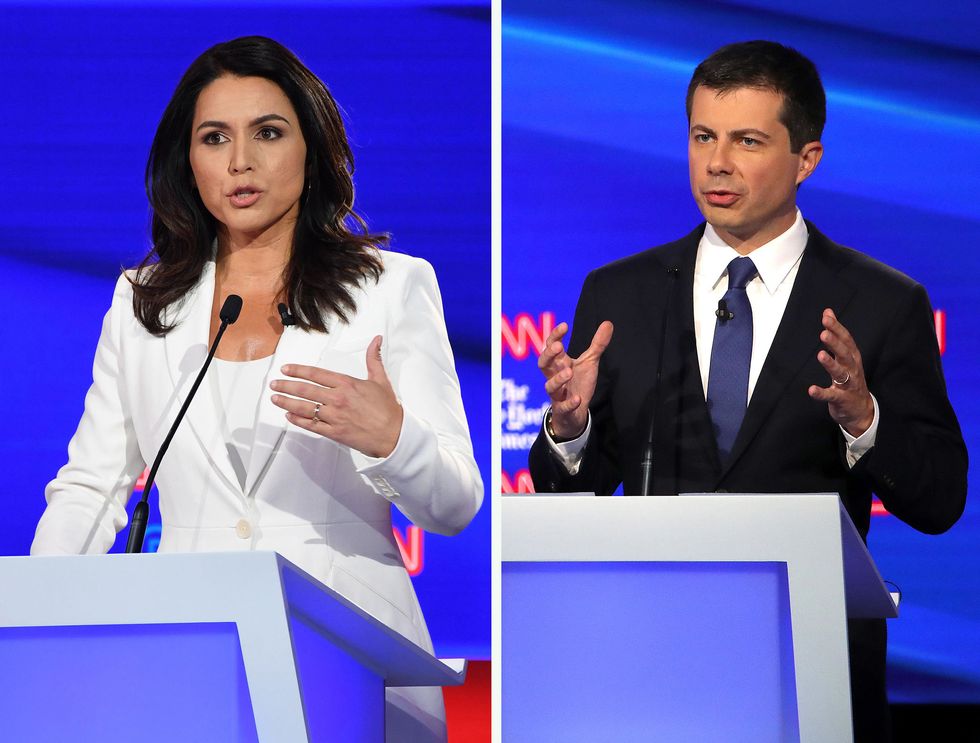
"What you're saying, Mayor Pete," Gabbard said, "is that you would continue to support having U.S. troops in Syria for an indefinite period of time to continue this regime change war."
Gabbard also said the U.S. efforts in Syria have undermined national security and U.S. weapons have ended up in the hands of terrorist groups, such as Al-Qaeda, in Syria.
Buttigieg said that more important was the credibility of the United States.
"What we were doing in Syria was keeping our word," Buttigieg said. "Part of what makes it possible for the United States to get people to put their lives on the line to back us up is the idea that we will back them up, too."
Gun Control
Likely the most heated debate of the night was between Mayor Buttigieg and former Texas Representative Beto O'Rourke. O'Rourke took a passionate stance on gun control following August's shooting in his hometown of El Paso, Texas.
"I think almost everyone on this stage agrees that it's not right and as president would seek to ban the sale of AR-15s and AK-47s," O'Rourke said.
"So if the logic begins with those weapons being too dangerous to sell, then it must continue by acknowledging, with 16 million AR-15s and AK-47s out there, they are also too dangerous to own. Every single one of them is a potential instrument of terror."
O'Rourke is one of the few candidates who supports a mandatory buyback of assault weapons. Mayor Buttigieg has previously described O'Rourke's plan as a "shiny object."
"On guns, we are this close to an assault weapons ban," Buttigieg said. "That would be huge. And we're going to get wrapped around the axle in a debate over whether it's 'hell, yes, we're going to take your guns'?"
Buttigieg attacked O'Rourke for not having a plan to enforce mandatory buybacks.
"If you can develop the plan further, I think we can have a debate about it," Buttigieg said. "But we can't wait. People are dying in the streets right now."
Buttigieg also characterized popular gun control proposals, such as universal background checks and red flag laws, as "purity tests" that couldn't wait to be passed, although he did not propose another solution.
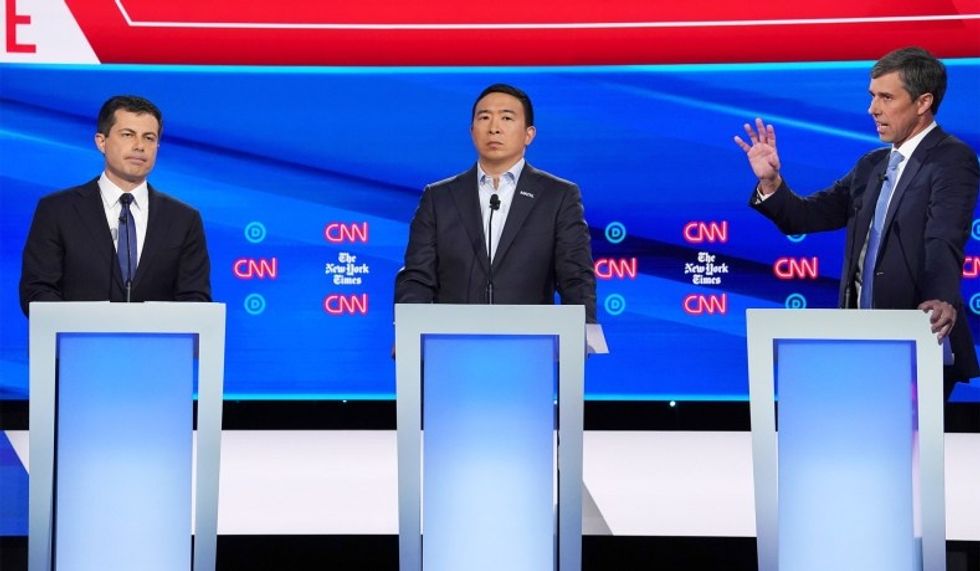
Other candidates such as Senators Warren and Klobuchar favor voluntary buybacks. Former HUD Secretary Castro also opposes mandatory buybacks, especially those that involve enforcement.
"I am not going to give these police officers another reason to go door to door in certain communities," Castro said, "because police violence is also gun violence, and we need to address that."
Castro referenced the recent murder of Atatiana Jefferson, a black woman killed by a white police officer in Fort Worth, Texas, when the police officer shot through the window of Jefferson's home while responding to a welfare check.
Opioid Epidemic
The next topic of Tuesday's debate was the opioid epidemic.
All candidates that spoke on this issue were in favor of holding pharmaceutical companies accountable for the crisis, including jailing drug company executives.
Businessman Steyer placed the blame on corporate control of government.
"We have a broken government because corporations have bought it," Steyer said. "And every single one of these conversations is about that broken government. It's about drug companies or gun manufacturers buying the government and getting what they want.
"We need to break the corporate stranglehold on our government."
Entrepreneur Yang proposed decriminalizing opiates for personal use and referring people to treatment rather than prison.
Former Representative O'Rourke also supports decriminalizing opiates, in addition to prescribing medical marijuana instead of opiates.
Senator Sanders agreed drug companies needed to be held accountable.
"They knew that they were selling a product to communities all over this country which were addicting people and killing them," Sanders said. "And last year, the top 10 drug companies made $69 billion in profit. This is what unfettered capitalism is doing to this country."
Technology
Senator Warren has proposed to break up big tech companies such as Facebook, Amazon and Google. Entrepreneur Yang agrees to an extent but said increased competition would not solve the problem.
"It's not like breaking up these big tech companies will revive Main Street businesses around the country," Yang said.
Businessman Steyer agreed that monopolistic companies needed to be broken up or regulated, but he also pointed out the importance of prioritizing business in a Trump economy.
"We're going to have to show the American people that we don't just know how to tax and have programs to break up companies," Steyer said, "but also talk about prosperity, talk about investing in the American people, talk about harnessing the innovation and competition of the American private sector."
Former Representative O'Rourke supported stricter regulations on tech companies and proposed treating them as publishers instead of as utilities. However, he disagreed that he would break up big companies as president.
"I don't think it is the role of a president or a candidate for the presidency to specifically call out which companies will be broken up," O'Rourke said. "That's something that Donald Trump has done, in part because he sees enemies in the press and wants to diminish their power. It's not something that we should do."
Another tense conflict of the night was when Senator Harris called on Senator Warren to support Twitter banning President Trump's account, citing harassment and hate speech that go against Twitter's terms of service.
"You can't say you're for corporate responsibility if it doesn't apply to everyone," Harris said.
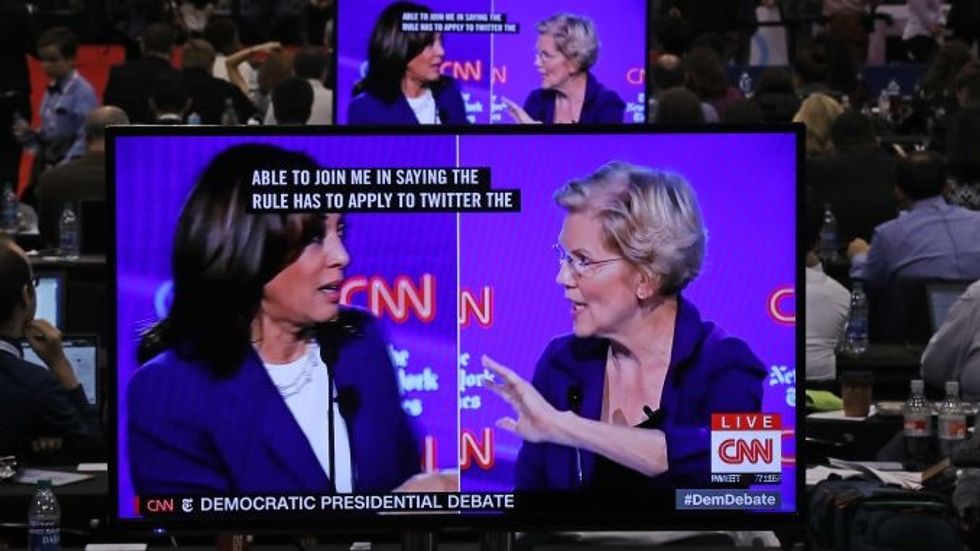
Warren deflected the question by talking about campaign finance related to big corporations. She said candidates who talk about breaking up big tech corporations shouldn't accept money from those same corporations.
Vox reported Senator Harris received the highest amount of donations from big tech companies in Q1 of 2019. Senator Warren received the highest amount of donations from big tech companies in Q3 preceding her announcement that she would not accept donations over $200 from tech executives.
Reproductive Rights
The debate turned to reproductive rights, a topic that had been avoided in previous debates, resulting in criticism. The first question was given to Senator Harris, who pivoted the earlier healthcare debate to reproductive rights.
Harris said she would have her Department of Justice give pre-clearance to laws that potentially violate the Constitution, especially Roe v. Wade.
"Because the reality is," Harris said, "that while we still have these state legislators who are outdated and out of touch, mostly men who are telling women what to do with their bodies, then there needs to be accountability and consequence."
A popular sentiment among the candidates was codifying Roe v. Wade, making it into law. Multiple candidates expressed their support for codification, including former Vice President Biden, Senators Klobuchar and Booker, Mayor Buttigieg, Representative Gabbard, and former Secretary Castro.
Senator Booker had a unique plan to protect reproductive rights.
"They're particularly another example of people trying to punish, trying to penalize, trying to criminalize poverty," Booker said, "because this is disproportionately affecting low-income women in this country, people in rural areas in this country.
It is an assault on the most fundamental ideal that human beings should control their own body."
Booker proposed creating an Office of Reproductive Freedom and Reproductive Rights in the White House to fight critics of Roe v. Wade and make sure all women have access to abortion and healthcare when needed.
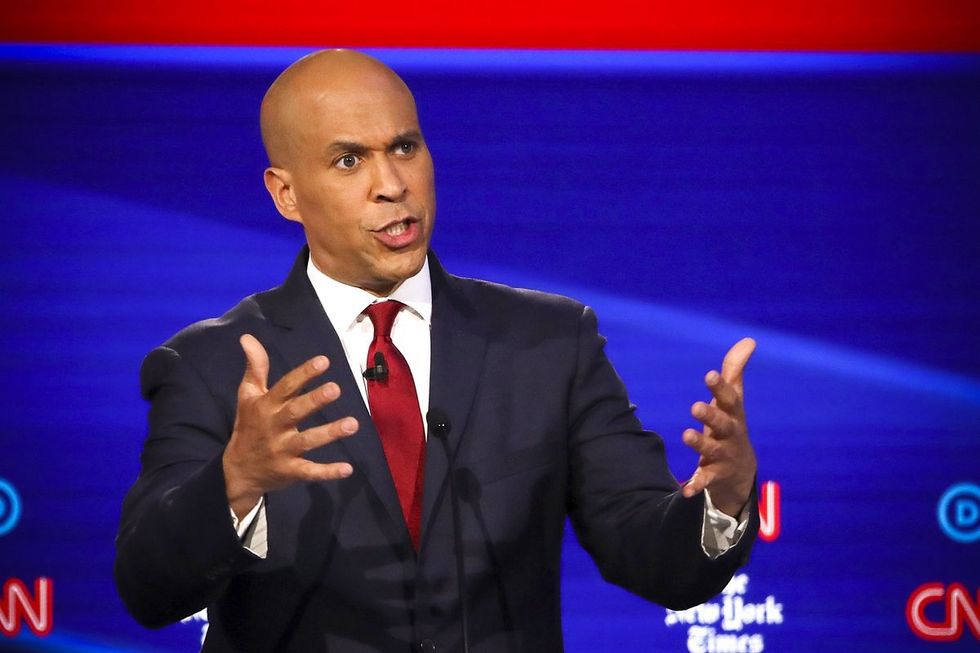
Representative Gabbard contrasted herself from other candidates by explicitly saying she did not support third-trimester abortions. Gabbard said abortions should be "safe, legal and rare," quoting former Secretary of State and presidential candidate Hillary Clinton.
Another proposal with widespread support was the repeal of the Hyde Amendment, which prohibits federal funding of clinics that perform abortions. The Hyde Amendment has long held critics of Roe v. Wade at bay with the promise that no taxpayer dollars will be spent on abortions.
Senator Booker and former Secretary Castro both spoke on this proposal.
"You shouldn't only be able to have reproductive freedom if you have money," Castro said. "We have to think about people who do not, people who are poor."
Mayor Buttigieg used the issue of reproductive rights to explain his plan for Supreme Court reform.
"I'm not talking about packing the court just with people who agree with me," Buttigieg said, "although I certainly will appoint people who share my values, for example, the idea that women's reproductive freedom is an American right."
Buttigieg has proposed expanding the number of Supreme Court justices from nine to 15, with 10 justices being presidential appointees as they are now; the other five would have to be appointed unanimously by the first 10 justices.
"We can't go on like this," Buttigieg said, "where every single time there is a vacancy, we have this apocalyptic ideological firefight over what to do next."
Buttigieg said he also supports other reforms, including term limits and rotation of justices from the appellate bench.
Senator Warren disagreed that reproductive rights have to be secured through Supreme Court rule, as it is now with Roe v. Wade.
"Three out of four Americans believe in the rule of Roe v. Wade," Warren said. "When you've got three out of four Americans supporting it, we should be able to get that passed through Congress. We should not leave this to the Supreme Court. We should do it through democracy, because we can."
Biden and Warren Collide
An explosive moment of the debate came towards the end between Senator Warren and former Vice President Biden.
"I'm the only one on this stage that has gotten anything really big done," Biden said, "from the Violence Against Women Act to making sure that we pass the Affordable Care Act."
Senator Warren pointed out that she created the Consumer Protection Financial Bureau in 2008.
Former Vice President Biden argued he deserved credit for Warren's success with the agency.
"I went on the floor and got you votes," Biden said with a raised voice. "I got votes for that bill. I convinced people to vote for it. So let's get those things straight, too."
Warren, taking a deep breath, composed herself to respond to Biden.
"I am deeply grateful to President Obama," Warren said with a pointed look, "who fought so hard to make sure that agency was passed into law."
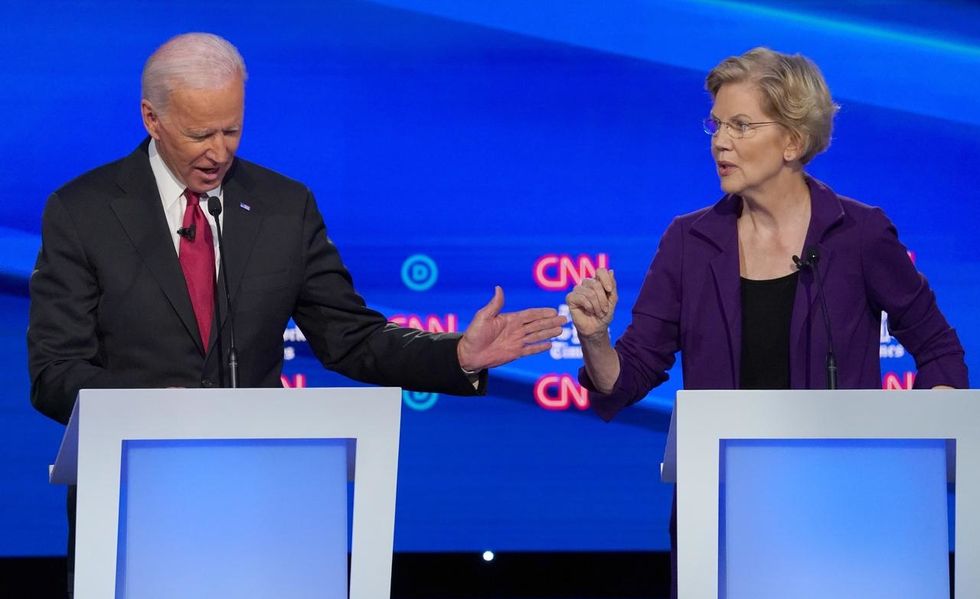
In Summation
Tuesday's debate was a grueling three hours of policy nitpicking, ad hominem attacks, and canned applause lines. Yet within the frustration was an underlying connection – hope. It was inspiring to watch the candidates for president speak so passionately about the future of the country. Despite their differences, every candidate has a common goal: to make America great for everyone.

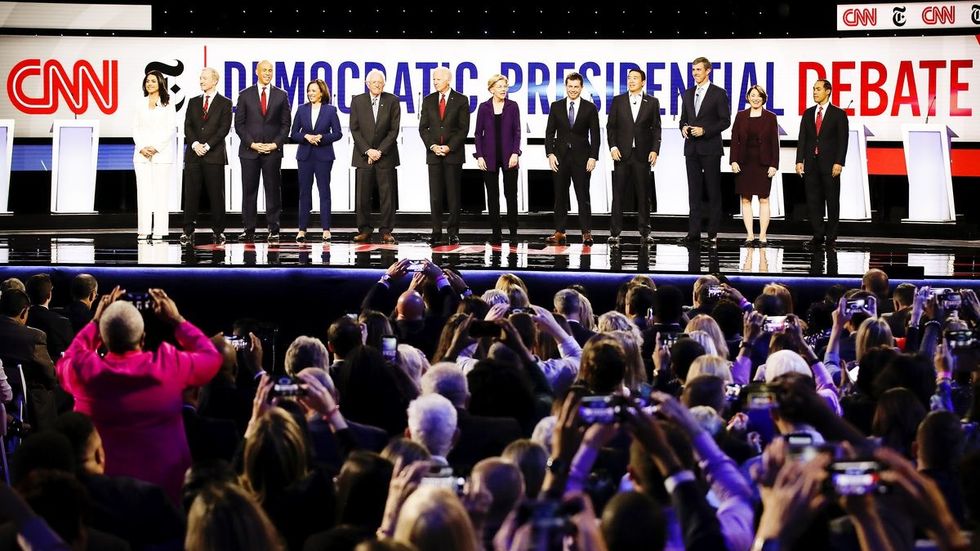








 Photo by
Photo by  Photo by
Photo by  Photo by
Photo by 






